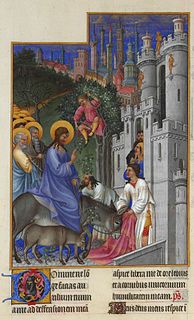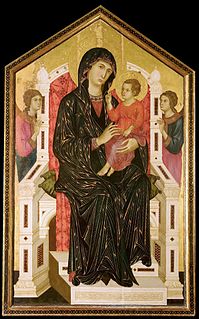Related Research Articles

A cardinal is a senior member of the clergy of the Catholic Church. Cardinals are created by the pope and typically hold the title for life. Collectively, they constitute the College of Cardinals.

The pope, also known as supreme pontiff, Roman pontiff or sovereign pontiff, is the bishop of Rome, head of the worldwide Catholic Church, and has also served as the head of state or sovereign of the Papal States and later the Vatican City State since the eighth century. From a Catholic viewpoint, the primacy of the bishop of Rome is largely derived from his role as the apostolic successor to Saint Peter, to whom primacy was conferred by Jesus, who gave Peter the Keys of Heaven and the powers of "binding and loosing", naming him as the "rock" upon which the Church would be built. The current pope is Francis, who was elected on 13 March 2013.

The Holy Rosary, also known as the Dominican Rosary, or simply the Rosary, refers to a set of prayers used in the Catholic Church, and to the physical string of knots or beads used to count the component prayers. When referring to the prayer, the word is usually capitalized ; when referring to the prayer beads as an object, it is written with a lower-case initial letter.

Holy Week is the most sacred week in the liturgical year in Christianity. In Eastern Churches, which includes Eastern Orthodox, Eastern Catholic and Eastern Lutheran traditions, Holy Week occurs the week after Lazarus Saturday and starts on the evening of Palm Sunday. In the denominations of the Western Christianity, which includes the Roman Catholicism, Lutheranism, Moravianism, Anglicanism, Methodism and Reformed Christianity, it begins with Palm Sunday and concludes on Easter Sunday. For all Christian traditions it is a moveable observance. In Eastern Rite Churches, Holy Week starts after 40 days of Lent and two transitional days, namely Saturday of Lazarus and Palm Sunday. In the Western Christian Churches, Holy Week falls on the last week of Lent or Sixth Lent Week.
In the Catholic Church, holy days of obligation are days on which the faithful are expected to attend Mass, and engage in rest from work and recreation, according to the Third Commandment.

Tenebrae is a religious service of Western Christianity held during the three days preceding Easter Day, and characterized by gradual extinguishing of candles, and by a "strepitus" or "loud noise" taking place in total darkness near the end of the service.

A diocesan administrator is a provisional ordinary of a Roman Catholic particular church.

The Holy Family consists of the Child Jesus, the Virgin Mary and Saint Joseph. The subject became popular in art from the 1490s on, but veneration of the Holy Family was formally begun in the 17th century by Saint François de Laval, the first bishop of New France, who founded a confraternity.
The Catholic Church historically observes the disciplines of fasting and abstinence at various times each year. For Catholics, fasting is the reduction of one's intake of food, while abstinence refers to refraining from something that is good, and not inherently sinful, such as meat. The Catholic Church teaches that all people are obliged by God to perform some penance for their sins, and that these acts of penance are both personal and corporeal. Bodily fasting is meaningless unless it is joined with a spiritual avoidance of sin. Basil of Caesarea gives the following exhortation regarding fasting:
Let us fast an acceptable and very pleasing fast to the Lord. True fast is the estrangement from evil, temperance of tongue, abstinence from anger, separation from desires, slander, falsehood and perjury. Privation of these is true fasting.
"Octave" has two senses in Christian liturgical usage. In the first sense, it is the eighth day after a feast, reckoning inclusively, and so always falls on the same day of the week as the feast itself. The word is derived from Latin octava (eighth), with dies (day) understood. In the second sense, the term is applied to the whole period of these eight days, during which certain major feasts came to be observed.

The Mass is the central liturgical rite in the Catholic Church, encompassing the Liturgy of the Word and the Liturgy of the Eucharist, where the bread and wine are consecrated and become the Body and Blood of Christ. As defined by the Church at the Council of Trent, in the Mass, "the same Christ who offered himself once in a bloody manner on the altar of the cross, is present and offered in an unbloody manner". The Church describes the Mass as the "source and summit of the Christian life". Thus the Church teaches that the Mass is a sacrifice. It teaches that the sacramental bread and wine, through consecration by an ordained priest, become the sacrificial body, blood, soul, and divinity of Christ as the sacrifice on Calvary made truly present once again on the altar. The Catholic Church permits only baptised members in the state of grace to receive Christ in the Eucharist.
In the canon law of the Catholic Church, an oratory is a place which is set aside by permission of an ordinary for divine worship, for the convenience of some community or group of the faithful who assemble there, but to which other members of the faithful may have access with the consent of the competent superior. The word oratory comes from the Latin verb orare, to pray.
E supremi was a papal encyclical issued by Pope Pius X on October 4, 1903. This was the first encyclical issued by the pontiff. He expressed his deep feelings of unworthiness by quoting the plight of Anselm of Canterbury. The pope saw the current age as wracked with troubles and even thought that we had perhaps reached the end of days. He fervently wished to administer to the spiritual needs of the day - emphasizing the Catholic position on marriage, education, respect for property, maintaining order and justice in the social classes. He emphasized the great importance of educating priests and of maintaining the highest level of morals in seminarians.
In the Catholic Church, the Precepts of the Church, sometimes called Commandments of the Church, are certain laws considered binding on the faithful. As usually understood, they are moral and ecclesiastical, broad in character and limited in number. In modern times there are five. These specifically Catholic commandments flow from and lead to the Ten Commandments which are common to all the Abrahamic religions(except Islam).

Mariological papal documents have been a major force that has shaped Roman Catholic Mariology over the centuries. Mariology is developed by theologians on the basis not only of Scripture and Tradition but also of the sensus fidei of the faithful as a whole, "from the bishops to the last of the faithful", and papal documents have recorded those developments, defining Marian dogmas, spreading doctrines and encouraging devotions within the Catholic Church.

The 1983 Code of Canon Law, also called the Johanno-Pauline Code, is the "fundamental body of ecclesiastical laws for the Latin Church". It is the second and current comprehensive codification of canonical legislation for the Latin Church sui iuris of the Catholic Church. It was promulgated on 25 January 1983 by John Paul II and took legal effect on the First Sunday of Advent 1983. It replaced the 1917 Code of Canon Law which had been promulgated by Benedict XV on 27 May 1917.

Lent is a solemn religious observance in the Christian liturgical calendar commemorating the 40 days Jesus spent fasting in the desert and enduring temptation by Satan, according to the Gospels of Matthew, Mark and Luke, before beginning his public ministry. Lent is observed in the Anglican, Eastern Orthodox, Lutheran, Methodist, Moravian, Oriental Orthodox, Persian, United Protestant and Roman Catholic traditions. Some Anabaptist, Baptist, Reformed, and nondenominational Christian churches also observe Lent, although many churches in these traditions do not.
An ordinariate for the faithful of Eastern rite is a geographical ecclesiastical structure for Eastern Catholic communities in areas where no eparchy of their own particular Church has been established. This structure was introduced by the apostolic letter Officium supremi Apostolatus of 15 July 1912.
Superiore anno is an encyclical by Pope Leo XIII, issued on August 30, 1884, on the recitation of the Rosary. It was signed a year after Supremi apostolatus officio.
In the canon law of the Catholic Church, the computation of time, also translated as the reckoning of time, is the manner by which legally-specified periods of time are calculated according to the norm of the canons on the computation of time. The application of laws frequently involves a question of time: generally three months must elapse after their promulgation before they go into effect; some obligations have to be fulfilled within a certain number of days, or weeks, or months. Hence the need of the rules for the computation of time. With the Code of 1917 and the reformed Code of 1983, the legislator has formulated these rules with a clearness and precision that they never had before.
References
- ↑ "Supremi disciplinæ" in Catholic Encyclopedia
- ↑ Codex Iuris Canonici canon 1247 (1917).